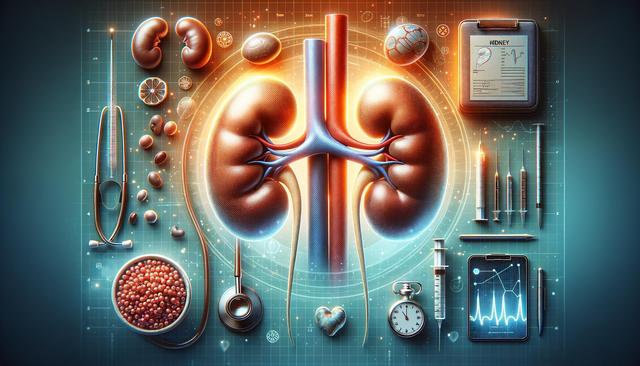What Is Kidney Disease?
Kidney disease refers to a condition where the kidneys are damaged and unable to filter blood effectively. The kidneys play a crucial role in removing waste, balancing fluids, and regulating blood pressure. When they are compromised, toxins and excess fluids can build up in the body, leading to a variety of health complications. Kidney disease can be acute, meaning it develops suddenly, or chronic, which progresses over time. Chronic kidney disease (CKD) is more common and often results from long-term conditions such as diabetes or high blood pressure. Understanding the distinction between acute and chronic kidney issues is essential for appropriate treatment and management.
The stages of chronic kidney disease are classified based on the kidney’s filtering capacity, known as the glomerular filtration rate (GFR). There are five stages, with stage 5 being end-stage renal disease (ESRD), requiring dialysis or a kidney transplant. Early detection and intervention can significantly slow the progression of the disease and improve quality of life.
Common Causes and Risk Factors
Several underlying conditions and lifestyle factors contribute to the development of kidney disease. Awareness of these can help individuals take preventive measures. The most frequent causes include:
- Diabetes: High blood sugar levels can damage the kidneys’ filtering units.
- High blood pressure: Increased pressure can stress and injure the kidneys over time.
- Glomerulonephritis: An inflammation of the kidney’s filtering units, often due to autoimmune disorders.
- Polycystic kidney disease: A genetic disorder causing cysts to form in the kidneys.
- Prolonged use of certain medications: Non-steroidal anti-inflammatory drugs (NSAIDs) and some antibiotics can harm kidney function when used excessively.
In addition to these medical causes, lifestyle choices such as poor diet, smoking, and lack of exercise can exacerbate the risk. People with a family history of kidney problems or those over the age of 60 are also at higher risk. Regular health screenings can help detect early signs of kidney dysfunction, especially for individuals in high-risk groups.
Recognizing the Symptoms
Kidney disease is often called a “silent” condition because symptoms may not appear until the disease is advanced. However, being attuned to subtle changes in your health can help with early detection. Some signs that may indicate kidney problems include:
- Fatigue and weakness
- Swelling in the ankles, feet, or face
- Changes in urination frequency or appearance
- Shortness of breath
- Persistent itching or dry skin
- Metallic taste in the mouth or ammonia breath
These symptoms can often be mistaken for other conditions, which is why regular check-ups are vital. Blood tests and urine analyses are standard diagnostics used to evaluate kidney function. It’s important to discuss any persistent or unusual symptoms with a healthcare provider to ensure timely diagnosis and care.
Treatment and Management Strategies
While kidney disease cannot always be cured, especially in its chronic form, it can be managed effectively to prevent further damage. Treatment strategies typically focus on addressing the underlying causes and slowing the progression of the disease. Key management approaches include:
- Controlling blood sugar and blood pressure through medication and lifestyle changes
- Following a kidney-friendly diet that is low in sodium, potassium, and phosphorus
- Avoiding nephrotoxic medications unless prescribed and monitored
- Staying hydrated but avoiding fluid overload
- Regularly monitoring kidney function through lab tests
In some cases, dialysis or a kidney transplant may be necessary. Dialysis is a procedure that removes waste products and excess fluids from the blood when the kidneys are no longer able to perform this function. A kidney transplant involves replacing the damaged kidney with a healthy one from a donor. These options are generally considered when kidney function drops below a critical threshold and other treatments are no longer sufficient.
Living Well with Kidney Disease
Being diagnosed with kidney disease can be overwhelming, but many people lead fulfilling lives by making informed lifestyle changes and working closely with their healthcare team. Nutrition plays a central role in managing the condition. A dietitian with experience in kidney health can help develop a meal plan tailored to individual needs, taking into account protein intake, fluid balance, and essential nutrients. Physical activity is also beneficial, as it helps manage weight, improves cardiovascular health, and boosts overall well-being.
Emotional health is just as important. Coping with a chronic illness may bring about stress, anxiety, or depression. Support groups, counseling, and open communication with loved ones can make a significant difference. Additionally, staying informed and engaged in care decisions empowers patients to take control of their health journey. Self-management practices, such as keeping a health journal, tracking symptoms, and adhering to medication schedules, can help maintain stability and prevent complications.
People living with kidney disease should also be proactive about vaccinations and routine screenings to avoid infections and other health risks. As research continues and medical advancements emerge, treatment options and quality of life for individuals with kidney conditions are steadily improving.




Leave a Reply